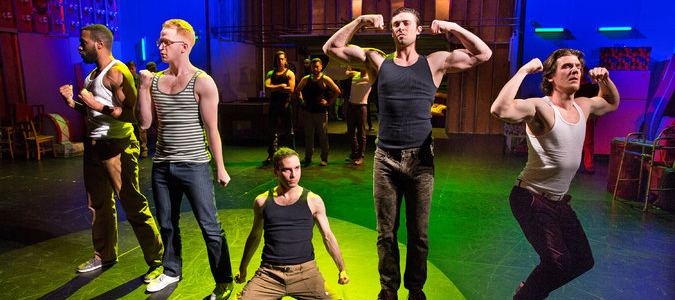

The Glory of the World
Opening Night: January 16, 2016
Closing: February 6, 2016
Theater: BAM Harvey Theater
The Solo cups are overflowing at the centennial birthday festivities of renowned mystic and Catholic monk Thomas Merton, author of “The Seven Storey Mountain.” In this explosive celebration from legendary writer-director duo Charles Mee (“Big Love”) and Les Waters (Sarah Ruhl’s “Eurydice”), 17 men in party hats assemble somewhere between Trappist monastery and plywood warehouse to toast Merton’s many faces, asking: What makes a man? What makes a saint? What if nothing is sacred—and everything is? As the night devolves, each facet of Merton’s contested image—silent monk, poet, spiritual anarchist, Buddhist thinker—inspires more speeches, slow dances, makeouts, fist fights, and silent reflections, amassing a layered portrait of what it is to be a human being, full of contradictions and brimming with life.
BUY TICKETSREAD THE REVIEWS:
January 21, 2016
Whose birthday is this, anyway? Thomas Merton’s? Or a gay circuit-party promoter’s? For much of the 80-minute running time of “The Glory of the World,” your best guess would probably be the promoter’s. Lop off the first and last few minutes of the show, excise some glib chatter about Merton’s life and thought, and you might never guess that this production, at the Harvey Theater of the Brooklyn Academy of Music, was meant to pay tribute to the work of a theologian and writer who spent much of his life in a Trappist monastery in Kentucky. Written by Charles L. Mee and directed by Les Waters, the production seems as much a repudiation of Merton’s spiritual values — he was a staunch Roman Catholic, who believed firmly in the tenets of the faith, even as his capacious intellect made room for appreciation of other religions — as a celebration of them. As noted above, the show is presented as a stylized centennial birthday party for Merton, who was born in 1915 and died in 1968. (The production had its premiere at the Actors Theater of Louisville last year.) His many books, most notably his acclaimed autobiography, “The Seven Storey Mountain,” continue to be read today. In that book, written in vigorous, keenly observed prose, Merton described his gradual and unusual path toward a life dedicated to spiritual contemplation.
READ THE REVIEW


















